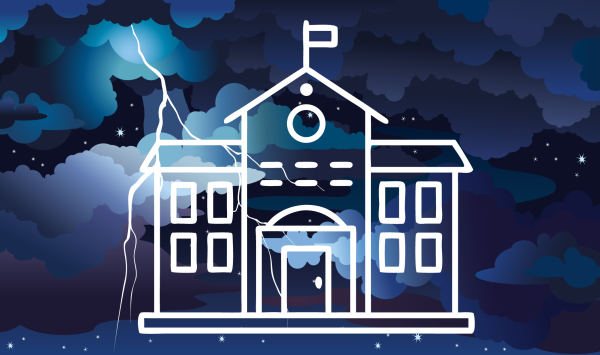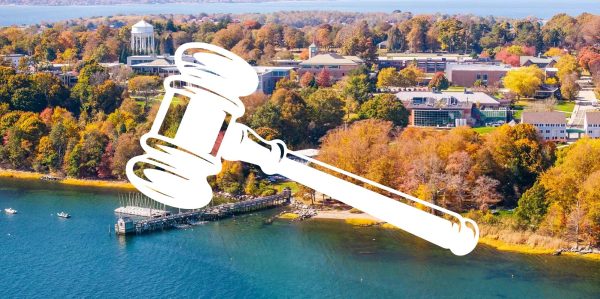Brotherhood, unity, empowerment
Kayla Ebner | The Hawks’ Herald
Brotherhood. Unity. Empowerment.
These are the core values that inspired senior Anthony Holehouse to reboot The Barbershop. This student-led club on campus aims to help men of color feel more welcome at RWU, and provide a space where they can truly be themselves, free of judgement.
“I didn’t necessarily feel like there was a club that welcomed me to the extent where I feel like I could be my whole self,” said Holehouse, who is now president of the club.
Vice President Carlos Ferman never imagined becoming a part of something bigger than himself when he entered his freshman year in the fall of 2018. Then, he met Holehouse at the Involvement Fair, and everything changed.
Holehouse was representing The Barbershop at the Fair. The club was created in the spring of 2016, but lost momentum during the last academic year due to most members of the e-board graduating.
He felt inspired to reboot the club after he thought about other kids who may be feeling the same way he did. The Barbershop left trial club status and entered full club status on Tuesday, March 26. The concept of the club began with Don Mays, former director of the Intercultural Center (IC).
“It was really him who pushed us forward in terms of starting something,” Holehouse said. “He wanted to see young men of color on campus come together and unite and form that brotherhood in which we could then empower each other and empower the university as a whole.”
In an interview with The Hawks’ Herald, Mays said he noticed that most of the organizations on campus were run by women, and that there was a lack of involvement among black and Latino men. This sparked conversations and meetings that resulted in the beginning of The Barbershop club.
“We had several meetings where we talked about issues that were specific to them and their concerns and how it sometimes felt like a burden being a man of color on the Roger Williams campus, and not having a place for their voice to fit in or be heard,” Mays said.
The club name came about when Mays asked Holehouse to think of a place where he meets people and can feel comfortable with them. Holehouse immediately answered, “the barbershop.”
Mays described the barbershop as a gathering spot in the black community where men, especially black men, can talk about things that are important to them.
“I’m leaving feeling like I maybe talked about something that was on my chest or learned something, or just goofed around and had a good time,” Holehouse said.
Ferman agreed, noting that is exactly what The Barbershop intends to do.
“That’s the kind of environment we want to foster, a welcoming environment. It’s about taking that welcoming feeling and bringing it to campus,” he said.
Mays pushed Holehouse to take on a leadership role in developing the club.
“I think he underestimated his potential as a leader on campus,” Mays said. “I think he thought that he could be a leader, but he was not thinking that [RWU] was the place that he could be a leader. I kept pushing him that his voice is important for a place like [RWU], where there is so little representation, and that if he could embrace that, he could do very well and the campus would benefit from that. I think that’s where he is, and where [RWU] is now.”
Zoila Quezada, the club’s adviser and director of institutional diversity, equity and inclusion, said that while the IC works to help the club create spaces of comfort for students, she does not want the IC to be the only space where students of color feel like they can go. One of her biggest wishes for these students is that they will be “able to be themselves outside of the IC or outside of Barbershop, but also [make] sure The Barbershop is a home they can come back to.”
One of the ways the students work toward this goal is by having guest speakers come and talk with the group. The Barbershop recently hosted Professor Erin Allen, who spoke with them about the identity of a black man and how that is portrayed on a predominantly white campus.
Freshman Christian Thomas, secretary of The Barbershop, said it can be hard being one of the few students of color in the classroom. He said when he hangs out with students in The Barbershop, he feels comfortable talking about things that were brought up in class.
“This club gives us a safe space to talk to about what is going on,” Thomas said.
Holehouse added that his experience working in the Admissions Office for two years gave him a different perspective as to how the university was approaching diversity and inclusion. He acknowledged the significant improvements that have been made recently, but noted that it has not always been that way.
“I can tell you for sure, at least from my experience, they weren’t necessarily focusing on black and brown students and recruiting them to Roger Williams University like they are taking diversity initiatives now,” Holehouse said.
According to Megan Lynch at the Office of Institutional Research, based on the first-year class that entered in the fall of 2017, the retention rates for the class as a whole and for students of color were both 81 percent. The retention rate includes what percent of a class is still at RWU one year later, and was based on a report run in October of 2018 after the add/drop period.
The university also states that the number of students of color in the first-year class increased from 10 percent to 18 percent in recent years. Dr. Lambert said that international students make up 2 percent of the class, and 4.6 percent includes permanent residents of the U.S. and dual citizens.
Chief Diversity Officer Ame Lambert said the university has begun to separate this data into smaller parts.
“…what we have begun to do is disaggregate data and use an intersectional lens, such as layering on Pell eligibility, first generation status and gender identity to students of color and looking at different groups under the student of color umbrella,” she said. “This means under the overall rate, are many different rates of graduation and we are currently doing a deeper dive into that.”
Holehouse noticed an increase in diversity on campus within the past year, and said this was one of the driving reasons for the creation of The Barbershop. Ferman said many of the club’s members come from a household or neighborhood where they are used to seeing diversity on a level that is not on RWU’s campus.
“By the time we come to this campus and the whole culture just changes, some kids unfortunately have to, what we call, adapt and change their identity, and there are other kids who refuse to do that, and others that have to stick out like a sore thumb,” Ferman said. “By creating this type of environment, we foster an atmosphere where kids feel themselves.”
Freshman and treasurer of the club, Derick Pinto, said creating an environment “for all of us to come together and bond and get a sense of welcoming” is their main goal.
Dr. Lambert spoke about the importance of having groups like The Barbershop on campus.
“The Barbershop group is critical because men of color are truly underrepresented among students and employees. Our students look to each for mentorship, community, support and role modeling,” she said. “We are fully committed to the success of men of color on campus and as a result are incredibly invested in The Barbershop, which is the only group on campus focused on the unique needs of men of color. It is also an amazing platform for leadership development for group members and a great way for them to engage directly with the administration.”
While the club’s mission statement focuses on promoting “community engagement and activity amongst the men of color on campus,” Holehouse said the club is open to anyone who may find an interest in the club, no matter their race, creed or gender.
“We welcome them to share their own ideas, experiences with us,” he said. “I will say and this goes for anything we do not tolerate ignorance, racism, hate, within our club or campus.”
The Barbershop hosts weekly meetings on Fridays at 5 p.m. in the Multipurpose Room in the IC. Now that the club is officially back, the e-board is excited to plan more events in the future.
“We understand why we’re here and we want the campus to understand that this is not just for us, this is a real social issue,” said Holehouse. “We’re pushing for social justice so we can see more people like ourselves succeed.”





